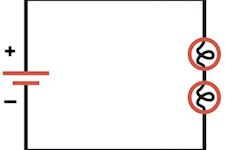Basic Fundamentals Of Electricity And DC Circuit Analysis
Skill Success
Summary
- Certificate of completion - Free
- Tutor is available to students
Add to basket or enquire
Overview
This course includes lifetime access so you can complete it at your own speed.
This course is designed for those interested to learn the basic concepts of electricity, its laws, theorems, and DC circuit analysis as it is applied to resistors, capacitors and inductors.
Benefits of taking this course include:
- Unlimited and lifetime access to the course
- Learn the course at your own pace
- Course can be accessed on any platform
- 24/7 Customer support
Certificates
Certificate of completion
Digital certificate - Included
Course media
Description
Who this course is for:
- Anyone wanting to understand the basic concepts of electricity, its laws, theorems and DC circuit analysis as it applies to resistors, capacitors and inductors
What you'll learn:
- Fundamental concepts of electrical direct current circuits
- Ohm's Law
- Series and Parallel Circuits
- Circuit Theorems (Thevenin, Norton, Superposition)
- Kirchhoff's Laws
- Mesh Circuits
- Network Analysis
This course examines Ohm's Law, Series and Parallel Circuits, the first, and perhaps most important, the relationship between current, voltage, and impedance, Ohm’s Law, and its relevance to Series and Parallel Circuits. Subsequently, this will lead to the development of Kirchhoff's Laws as they help to further analyze Network Analysis & Metering Circuits.
Conductors and Insulators are investigated along with their connected components, Capacitors, Inductors and how they are influenced by Electromagnetism.
Basic Fundamentals Of Electricity And DC Circuit Analysis will cover the following topics:
- Ch – 00 Intro Basic Electricity
- Ch – 01 The Nature Of Electricity
- Ch – 02 Conductors & Insulators
- Ch – 03 Current And Electric Circuits
- Ch – 04 Ohm’s Law
- Ch – 05 Electric Power
- Ch – 06 Series & Parallel Circuits
- Ch – 07 Circuit Theorems
- Ch – 08 Electric Fields And Capacitance
- Ch – 9 Magnetism and Inductance
- Ch – 10 Transient Response Capacitors & Inductors
Who is this course for?
This course is designed for those interested to learn the basic concepts of electricity, its laws, theorems, and DC circuit analysis as it is applied to resistors, capacitors and inductors.
Requirements
Understanding of basic math and linear equations
Career path
None
Questions and answers
Currently there are no Q&As for this course. Be the first to ask a question.
Reviews
Legal information
This course is advertised on reed.co.uk by the Course Provider, whose terms and conditions apply. Purchases are made directly from the Course Provider, and as such, content and materials are supplied by the Course Provider directly. Reed is acting as agent and not reseller in relation to this course. Reed's only responsibility is to facilitate your payment for the course. It is your responsibility to review and agree to the Course Provider's terms and conditions and satisfy yourself as to the suitability of the course you intend to purchase. Reed will not have any responsibility for the content of the course and/or associated materials.


